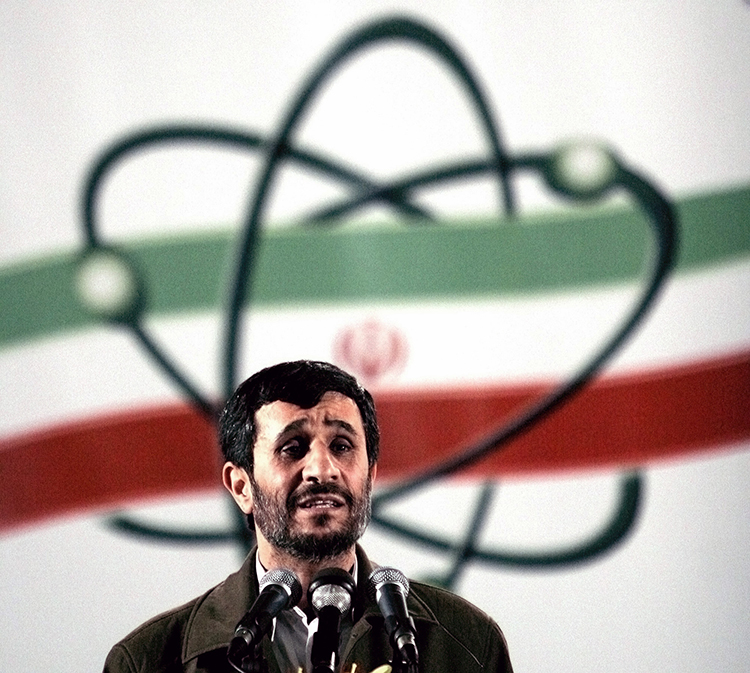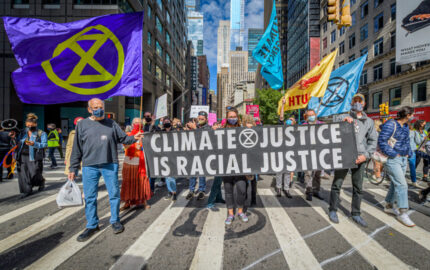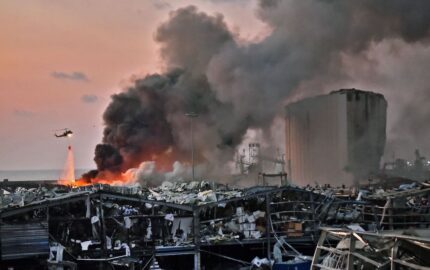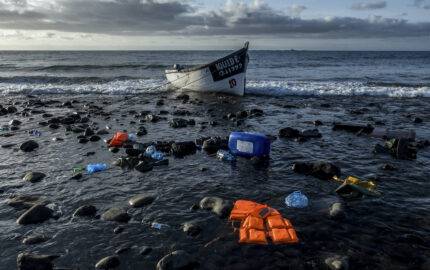For six years, New York Times national security reporter James Risen has been fighting to keep his promise of anonymity to a source who told him about a failed CIA initiative.
The latest round started last month when Risen asked the U.S. Supreme Court to recognize his First Amendment right to protect his source. If the justices don’t accept his case or rule against Risen, he’ll have to take the stand or risk going to jail.
Risen was in Boston on February 7 to accept an award from the New England First Amendment Coalition.
In brief remarks before Risen took the podium, Jill Abramson, executive editor of the Times, noted that he was first subpoenaed by the Bush administration and the Obama administration picked up the case after the subpoena lapsed in 2009. In both cases, the aim is to put a chill on the kind of stories Risen does. “Stay tuned,” she said. “We have a really good one coming.”
Risen, in his talk, chronicled the deterioration of press-government relations during his career as a journalist, focusing on the period since the mid-1990s that he has been covering national security.
Receiving the award, given in honor of the late Stephen Hamblett, a former publisher of The Providence (R.I.) Journal, brought Risen full circle from the 1970s when, as an undergraduate at Brown University he was a campus stringer for The Providence Journal. “I don’t think I wrote anything worthwhile but that’s when I got hooked [on journalism],” he said.
Back then, Risen said, he never thought that he’d one day be subpoenaed to reveal a source or be threatened with jail. “That was something that happened in China or Russia,” he said.
It wasn’t the only time China was mentioned at the awards luncheon. In his remarks before presenting the award, former Boston Globe investigative editor Walter V. Robinson quoted Vice President Joseph Biden’s words from a speech he gave in China late last year—“Innovation thrives where people breathe freely, speak freely, are able to challenge orthodoxy, where newspapers can report the truth without fear of consequences.”—and suggested the Obama administration would do well to heed its own advice.

James Risen's legal troubles stem from details about the CIA's failed effort to sabotage Iran's nuclear ambitions that he published in his 2006 book "State of War." Iran's president Mahmoud Ahmadinejad spoke about his country's nuclear program at an enrichment facility in Natanz in 2007. Photo by Hasan Sarbakhshian/Associated Press
Risen’s legal battle with the government started in 2006, the year he shared a Pulitzer Prize for a New York Times series on the federal government’s secret domestic eavesdropping program and the year his book “State of War: The Secret History of the CIA and the Bush Administration” was published. That book includes details from an anonymous source about the CIA’s failed effort to sabotage Iran’s nuclear research. The government subpoenaed Risen to testify at the trial of former CIA officer Jeffrey Sterling, who had been indicted for espionage. The US Court of Appeals upheld the subpoena.
Risen said there was a series of legal actions through 2008 and it was clear that the judge in the case was waiting to see who was going to be elected president. In the summer of 2009, the judge issued a very brief notice. The grand jury has expired, she said. What she was doing was inviting the Obama administration to quietly drop the case, but it didn’t.
“That’s been the great mystery,” Risen said. Why has the Obama administration taken the stand it has against a journalist? In remarks after his talk, Risen said the reason seems to be simply that Obama doesn’t like the press and wants to control it.
“It’s difficult to see where this leads—that’s the real thing that concerns me,” Risen said.
Risen started covering the CIA in 1995 while working for The Los Angeles Times in Washington, D.C. At that time, CIA officials would get upset when journalists confronted them with information they had discovered but they would quickly calm down and help with the story, Risen said. They’d arrange for top officials to flesh out the details. The agreement was that a journalist wouldn’t disclose that CIA officials had helped arrange the interviews. Then the CIA officials would go on TV and say, “I don’t know how the reporter got those interviews.”
Back then, a leak investigation had a whole different meaning from today. Someone at the CIA would tell a government lawyer, “I’m really upset about that story.” The lawyer would send a memo around asking who had talked to the reporter in question. Everyone would say “not me,” and that would be the end of the leak investigation. Even when there were stories that the CIA really disliked, they would never go after journalists, Risen said.
In the post-9/11 era, the situation is different. The Obama administration has initiated more leak investigations than any other president. “We’re now in the second decade of a transformation of our culture in ways that none of us want to admit,” Risen said. “I think that we have allowed ourselves to become a security state in ways that none of us recognized” because it happened incrementally.
“If we don’t stand up now,” he said, “it will only get worse."
The latest round started last month when Risen asked the U.S. Supreme Court to recognize his First Amendment right to protect his source. If the justices don’t accept his case or rule against Risen, he’ll have to take the stand or risk going to jail.
Risen was in Boston on February 7 to accept an award from the New England First Amendment Coalition.
In brief remarks before Risen took the podium, Jill Abramson, executive editor of the Times, noted that he was first subpoenaed by the Bush administration and the Obama administration picked up the case after the subpoena lapsed in 2009. In both cases, the aim is to put a chill on the kind of stories Risen does. “Stay tuned,” she said. “We have a really good one coming.”
Risen, in his talk, chronicled the deterioration of press-government relations during his career as a journalist, focusing on the period since the mid-1990s that he has been covering national security.
Receiving the award, given in honor of the late Stephen Hamblett, a former publisher of The Providence (R.I.) Journal, brought Risen full circle from the 1970s when, as an undergraduate at Brown University he was a campus stringer for The Providence Journal. “I don’t think I wrote anything worthwhile but that’s when I got hooked [on journalism],” he said.
Back then, Risen said, he never thought that he’d one day be subpoenaed to reveal a source or be threatened with jail. “That was something that happened in China or Russia,” he said.
It wasn’t the only time China was mentioned at the awards luncheon. In his remarks before presenting the award, former Boston Globe investigative editor Walter V. Robinson quoted Vice President Joseph Biden’s words from a speech he gave in China late last year—“Innovation thrives where people breathe freely, speak freely, are able to challenge orthodoxy, where newspapers can report the truth without fear of consequences.”—and suggested the Obama administration would do well to heed its own advice.

James Risen's legal troubles stem from details about the CIA's failed effort to sabotage Iran's nuclear ambitions that he published in his 2006 book "State of War." Iran's president Mahmoud Ahmadinejad spoke about his country's nuclear program at an enrichment facility in Natanz in 2007. Photo by Hasan Sarbakhshian/Associated Press
Risen’s legal battle with the government started in 2006, the year he shared a Pulitzer Prize for a New York Times series on the federal government’s secret domestic eavesdropping program and the year his book “State of War: The Secret History of the CIA and the Bush Administration” was published. That book includes details from an anonymous source about the CIA’s failed effort to sabotage Iran’s nuclear research. The government subpoenaed Risen to testify at the trial of former CIA officer Jeffrey Sterling, who had been indicted for espionage. The US Court of Appeals upheld the subpoena.
Risen said there was a series of legal actions through 2008 and it was clear that the judge in the case was waiting to see who was going to be elected president. In the summer of 2009, the judge issued a very brief notice. The grand jury has expired, she said. What she was doing was inviting the Obama administration to quietly drop the case, but it didn’t.
“That’s been the great mystery,” Risen said. Why has the Obama administration taken the stand it has against a journalist? In remarks after his talk, Risen said the reason seems to be simply that Obama doesn’t like the press and wants to control it.
“It’s difficult to see where this leads—that’s the real thing that concerns me,” Risen said.
Risen started covering the CIA in 1995 while working for The Los Angeles Times in Washington, D.C. At that time, CIA officials would get upset when journalists confronted them with information they had discovered but they would quickly calm down and help with the story, Risen said. They’d arrange for top officials to flesh out the details. The agreement was that a journalist wouldn’t disclose that CIA officials had helped arrange the interviews. Then the CIA officials would go on TV and say, “I don’t know how the reporter got those interviews.”
Back then, a leak investigation had a whole different meaning from today. Someone at the CIA would tell a government lawyer, “I’m really upset about that story.” The lawyer would send a memo around asking who had talked to the reporter in question. Everyone would say “not me,” and that would be the end of the leak investigation. Even when there were stories that the CIA really disliked, they would never go after journalists, Risen said.
In the post-9/11 era, the situation is different. The Obama administration has initiated more leak investigations than any other president. “We’re now in the second decade of a transformation of our culture in ways that none of us want to admit,” Risen said. “I think that we have allowed ourselves to become a security state in ways that none of us recognized” because it happened incrementally.
“If we don’t stand up now,” he said, “it will only get worse."


